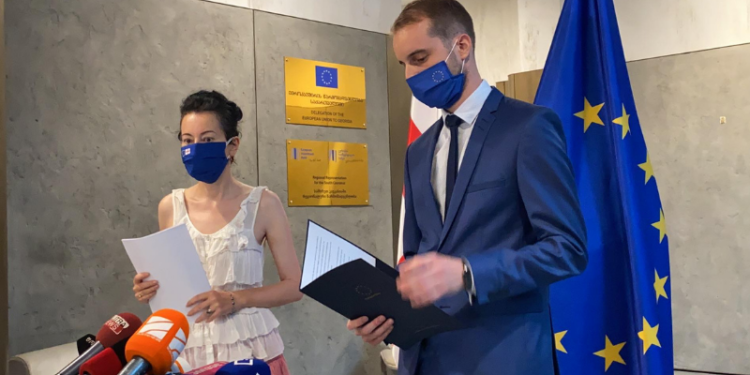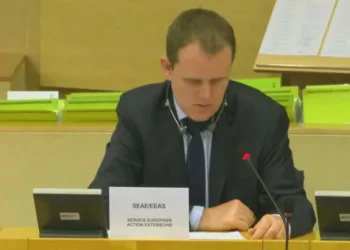“Georgia failed to sufficiently address the condition for the macro-financial assistance, and notably, to increase the independence, accountability and quality of the judicial system,” EU Charge d’Affaires ad interim, Julien Crampes said at the briefing held at the EU Delegation Office in Georgia.
He noted that the Government of Georgia notified the European Union of its decision to refrain from requesting EUR 75 million in EU macro-financial assistance, and the European Union takes note of the reasoning provided by the Georgian Government on their decision not to ask the rest of the EU micro-financial assistance.
However, he added, Georgia failed to sufficiently address the condition for this macro-financial assistance.
“This amount was due to be disbursed before 30 September 2021, should Georgia have been in compliance with the mutually agreed commitments taken by its Government in September 2020, when signing the conditions for this assistance program. The macro-financial assistance, EUR 150 million in total out of which half has been disbursed, was aimed at assisting Georgia and its citizens in addressing the challenges of the COVID-19 pandemic. These funds were intended to be available for the benefit of the Georgian people.
“The European Union takes note of the reasoning provided by the Georgian Government on their decision not to ask the rest of the EU micro-financial assistance. While we respect the decision of Georgian authorities, at the same time, we note that Georgia failed to sufficiently address the condition for this macro-financial assistance, and notably, to increase the independence, accountability and quality of the judicial system.
“In particular, the selection for Supreme Court judges proceeded in the absence of legislative changes needed to ensure full compliance with all recommendations made by the Venice Commission. The process also failed to guarantee equal treatment of all candidates. Several further legal changes aimed at increasing transparency of the court system have not been adopted.
“The justice-related conditions of the macro-financial assistance were also commitments taken by Georgian political parties when signing the 19 April 2021 Agreement, mediated by the European Union,” said Julien Crampes.
Earlier today, Georgian Prime Minister Irakli Garibashvili announced that government would refrain from taking the second part of the EU loan.
“In order to avoid any insinuation, we have decided to refrain from taking the second part of the EU loan,” he stated.
Garibashvili explains that the reason for the above decision is, on the one hand, “high economic growth in Georgia” and, on the other hand, the desire to reduce foreign debt.
Irakli Kobakhidze, the chairman of the Georgian Dream, said on PalitraNews yesterday that receiving macro-financial assistance from the European Union is no longer a financial necessity, as the economic growth has accumulated an additional 1 billion GEL in the budget.
In April 2020, due to the circumstances caused by the pandemic, Georgia requested macro-financial assistance from the European Union. Macro-financial assistance is an emergency tool developed by the EU in response to crises and is available to the EU’s neighboring countries.
Since 2008, the EU has conducted four macro-financial assistance operations in Georgia. Based on the decision of May 26, 2020, the European Union has provided macro-financial assistance to Georgia in the amount of 150 million euros.
The amount was divided into two equal tranches – the first tranche of 75 million was conditional on the fulfillment of obligations under the International Monetary Fund (IMF) and this amount was received by Georgia at the end of last year, while the transfer of the second 75 million would depend on the positive assessment of the European Commission of 7 preconditions Georgia took responsibility to fulfill. Among them, the main one concerned the reform of the justice system.
By Ana Dumbadze
Related Story: PM: Gov’t to Refrain from Taking Second Part of the EU Loan














